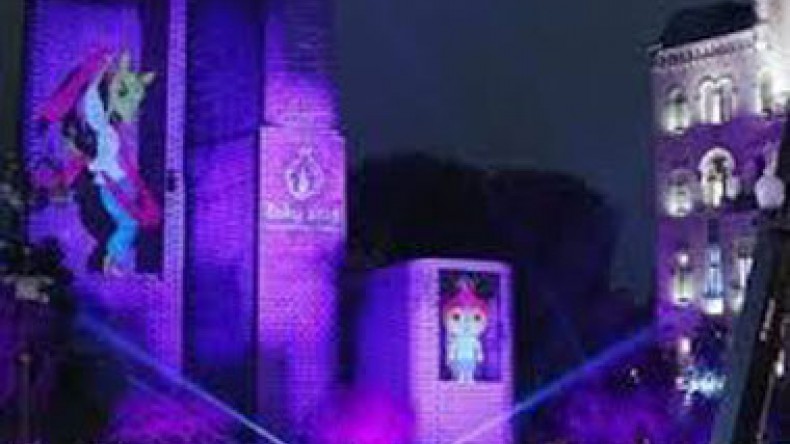
Azerbaijani citizens say government arranges EuroGames for foreigners without thinking about locals who barely make ends meet
Money is no object as the Azerbaijani government puts the finishing touches on the venues for the European Games. Large sums of money have been spent on sports arenas and on refurbishing the capital Baku and other host locations. For local residents, the games have meant a rising number of rules, restrictions and inconveniences, and many are none too happy about it, Nurgul Novruz writes on the website of Institute for War and Peace Reporting (IWPR).
As the June 12 start date approaches, buses in the capital Baku have had their routes changed or cancelled altogether, large weddings and funerals have been strongly discouraged, and people living in apartment blocks near the sports arenas have been told not to hang their washing out on their balconies. The latest ban prohibits cars registered outside Baku from coming into the city. The police say they need to reduce traffic to allow Euro-Games visitors to move around the city unhindered, according to the author of the article.
Salman Abdiyev brings produce from his home town Ganja to sell at Baku’s Green Markets. “I’ve maintained a household of seven by doing this for many years. I have regular customers. As soon as I arrive in Sahil on the fringes of Baku, the traffic police stop me and tell me I can’t go any further…. The government is arranging a festival for foreigners but no one is thinking about the lives of local people who can barely make ends meet,” he told IWPR.
Commuters like Qarakhan Rustamov, who lives in the satellite town of Khirdalan, are also struggling. “Now they won’t let me come into town in my car. I waste two hours travelling every day, I’m late for work and I get reprimanded by my managers. I used to do the trip in half an hour. I don’t know how to put my anger into words,” Rustamov resents. He sees no reason why people like him have to lose out because of an influx of visitors.
In Baku, yellow lines on the roads mark out “games lanes” reserved for visitors in specially-marked vehicles. Traffic police spokesman Vagif Asadov said that on day one alone, 1,500 drivers were each fined 40 manats (38 US dollars). “These bans, official and unofficial, are violations of the law and of human rights,” said Natiq Jafarli of the opposition movement REAL. “By doing this, the government is going to make its population even more unhappy.”
“These bans are there to give our visiting guests the impression that we have a good system here,” said Arastun Orujlu, head of the East-West Research Centre.
Some public-sector workers say their wages have been cut to represent “voluntary” donations to the European Games, with some schoolteachers sent on unpaid leave. “They’ve cut our wages three times since April. This is a rural area so our wages are lower anyway. We have to hand over 30 manats from our [monthly pay] of 210 manats. That’s a terrible injustice. But anyone who complains is threatened with dismissal,” one teacher from Samukhi district in northwest Azerbaijan told IWPR.
University examinations normally finish in July, but the education ministry said that they should finish by the end of May. “Students in the fourth [final] year are suffering most of all, as they had to finish classes, sit their semester and [annual] state exams, and defend their theses by May 31. There’s no point talking about educational standards. Education is being sacrificed to the European Games,” Seymur Kazimov, who teaches journalism at a Baku university, told IWPR.
According to Azeri Report, Azerbaijani officials are keen to use the European Games to showcase the capital, Baku, and the country at large, just as they did in 2012 when Azerbaijan hosted the Eurovision Song Contest. The Games are supported by the European Olympic Committee. “For now, the sporting and wider world's attention is focused on the chaos at FIFA, football's world governing body. But the growing repression in Baku also demands action,” say activists. “Beyond the glitzy, glamorous image, things have never been worse in Azerbaijan,” says Rebecca Vincent, coordinator of the Sport for Rights campaign. “Nearly everybody who is publicly critical has fled, been locked up or pressurised to be silent,” she adds.
President Ilham Aliyev's increasing repression is sounding alarms across Europe and in the USA. On 13 April 45 former US officials, experts, organisations and activists wrote to John Kerry, the US Secretary of State, noting that Azerbaijan has twice as many political prisoners as Russia and Belarus combined. The signatories called for visa bans and asset freezes on government officials involved in gross human rights abuses and the ceasing of trade promotion assistance to state-owned entities. "The government in Azerbaijan cannot be both a respected member of the international community and a repressive, kleptocratic autocracy. It must choose," Azeri Report writes.
According to the article, thus far, President Aliyev has been able to continue his deft balancing act. Still, there are signs that the regime is becoming rattled. President Aliyev did not attend the EU summit in Riga on 21 May, claiming he was too busy with preparations for the games.
On 12-28 June, Baku will host the first European Games under the auspices of the European Olympic Committee. According to media estimates, the Games will cost the Azerbaijani population $10 billion. However, they have become a serious headache for the locals with numerous bans and demolition of property. The preparatory works for the Games are accompanied by crackdowns and brutal repressions against dissent.
Related:
Newsfeed
Videos






























